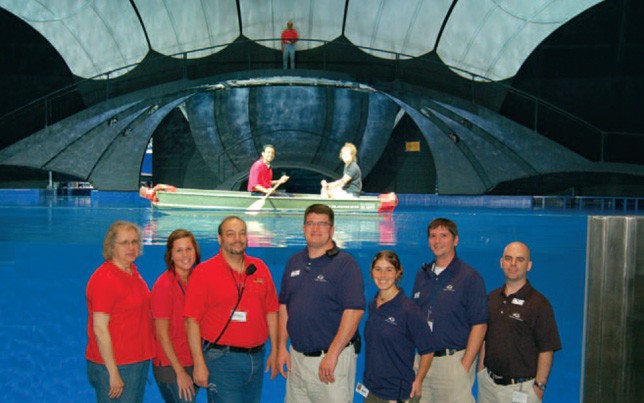
UC Graduates First Audiologists with Animal Expertise
In the Fall 2013 commencement, the College of Allied Health Sciences will graduate its first class of audiologists with a certificate in animal audiologythe first certificate program of its kind.
The certificate, launched in the fall of 2011, is a new focus area combining the fields of audiology and veterinary medicine. Creator and associate professor of communication sciences and disorders Pete Scheifele, PhD, says theres a growing need for audiologists who can test for and diagnose hearing problems in animals, particularly dogs.
"Currently, there are 80 breeds of dogs experiencing genetic deafnesswith more experiencing deafness due to age and noise, he says. "While veterinarians receive training in otology, they are not specifically trained in audiology for animals. Theres a growing demand for animal audiology servicesnot just from pet owners, but from the American Kennel Club and from organizations that work with service and working dogs.
The certificate is available to UC audiology doctoral students, as well as currently licensed audiologists. Students take three courses in animal physiology and electrophysiological hearing testing before completing a required 30-hour practicum.
Aniruddha Deshpande will be the first to receive the new certificate during the doctoral hooding and masters recognition ceremony Friday, Dec. 13.
Deshpande came to UC to get his PhD in audiology in 2009, when he met Scheifele and decided to also enroll in the certificate program.
"Ive always been interested in animal physiology and anatomy, he says. "My mother is a zoology professor and as a child, I always accompanied her to field trips. When I came to UC, I viewed the certificate as a golden opportunity to combine my skills and passion. I was thrilled with the prospectIve not found this program elsewhere. Ive had wonderful opportunities to put my skills to test, like the acoustic mapping of the dolphinarium at the Georgia Aquarium. With this program, you also have the opportunity to give back to the community via volunteer programs like the Canine Corps.
Deshpandes practicum for the certificate involved first serving as a technician in FETCHLAB during canine hearing screenings, then running hearing screenings and diagnostics under supervision.
UCs FETCHLAB is the only U.S. program that has the capability to teach animal audiology to certificate students. But this fall, Scheifele has worked to make the certificate more accessible to distance learning students. These new students can take their coursework online, and then have the choice of coming to UCs FETCHLAB or working with a local, approved veterinarian for their final practicum.
"We now have potential students from all over the U.S. who can take these courses online, says Scheifele. "Its a great thing, because well be able to teach students who are out in the population, already working as veterinarians or practicing audiologistsand were building connections with veterinarians so they can add audiology services to their existing practice.

Pete Scheifele, PhD, (left) and David Brown, PhD
Related Stories
UC researchers develop speech therapy video game
May 7, 2024
With ultrasound and a video game featuring a goat on roller skates, researchers at the University of Cincinnati are developing methods to help children overcome difficulties in pronouncing certain sounds, including the difficult “R.”
WVXU: A look at alcohol, de-alcoholized wine and everything in...
May 7, 2024
The University of Cincinnati's Michael Schoech joined Cincinnati Edition for a panel discussion about current rates of alcohol consumption and the growing number of non-alcoholic alternatives.
Washington Post: The hour after leaving day care is a...
May 6, 2024
The Washington Post highlighted research led by University of Cincinnati and Cincinnati Children's Hospital researchers that found kids eat fewer healthy foods and take in 22 percent of their day’s added sugar intake in the single hour after they’re picked up from child care.
